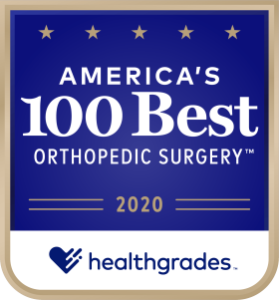The importance of Pediatric Orthopedics cannot be stressed enough. We all know the saying, “Kids will be kids.” A child does not always understand what pain is telling them, or the extent of their injury. They simply see trees to climb, puddles to jump in, and pets to chase. Despite the possibility of pain or injury, children are constantly going through growth spurts that may also present orthopedic challenges.
There are several musculoskeletal reasons why you may need to take your child to see a doctor that specializes in Pediatric Orthopedics.
Broken Bones
In the pediatric population, a broken bone poses a potential risky situation. Some bones don’t fully mature until the end of puberty. If your child suffers from a broken bone, they may have injured one of their growth plates. It is important to see a Pediatric Orthopedic doctor for a proper assessment and plan of care to avoid long lasting impairments by ensuring the bone heals in a straight and stable position.
Limb or Spinal Deformity
Unfortunately, deformities may be present at birth or they may develop later in childhood. Some examples are scoliosis and clubfoot. No matter what the time frame or diagnosis is, a Pediatric Orthopedic will be able to decide if surgery, braces, or occupational or physical therapy can help improve the deformity to avoid lifelong pain or disability.
Hip Dysplasia
Hip dysplasia, an unstable hip joint, can cause long term problems if not treated properly right away. There is the potential for long term hip pain, weakness, uneven leg lengths, and even the risk of early onset of arthritis. A visit with a Pediatric Orthopedic doctor will ensure there are no long-term dysfunctions.
Broken bones, deformities, and hip dysplasia barely begin to cover what Pediatric Orthopedic doctors can treat.
Some other pediatric specific diagnoses include:
Besides the level of expertise pediatric doctors have in treating these, and other conditions, Pediatric Orthopedics is important for many other reasons.
The Relationship
Pediatric Orthopedic specialists have years and years of experience working with children. If they did not have the ability to connect with kids, they would not be considered specialists. You can trust that your child will be in great, skilled hands and that your child may even be able to connect with their doctor, creating a trusting relationship.
This trusting relationship is key to really diagnosing and creating an individualized plan of care. If a child or the parent cannot feel comfortable around their doctor, the treatment plan and outcomes may suffer.
The Understanding of the Differences in Children and Adults
As mentioned earlier, children’s bones go through a maturing process throughout childhood and puberty. A Pediatric Orthopedic doctor understands the timeline of bone growth as well as the implications behind what different types of fractures and bone injuries can mean on long term growth and functional use of that bone or limb.
A Pediatric Orthopedic will also know the timeline for growth spurts and will keep this in mind when customizing a treatment plan. A child may be suffering from growing pains, or these pains may be a sign that they may be experiencing a more serious condition. A Pediatric Orthopedic doctor will be able to clearly identify the key differences and accurately diagnosis the problem.
Pediatric Orthopedics are well accustomed to what children may complain about and how these complaints may give clues, or even answers, to what is happening. They are excellent diagnosticians, which comes in handy when your child may not clearly be able to communicate what they are experiencing.
Difference Between a Pediatric Orthopedic and a Non-Pediatric Orthopedic
A typical doctor may refer to a child as a small adult and this is simply not the case. Children’s anatomy and their way of communicating is unique and different when compared to adults. And unfortunately, kids can suffer from musculoskeletal or neuromuscular diseases and dysfunctions that do not occur in adults. This can prolong the conclusion of an accurate diagnosis and treatment.
If your child appears to be suffering from pain, injury, or may benefit from a check-up, make an appointment with a Pediatric Orthopedic specialist for the best possible outcomes and the quickest plan of action.
The Content is not intended to be a substitute for professional medical advice, diagnosis, or treatment. Always seek the advice of your physician or other qualified health provider with any questions you may have regarding a medical condition.




